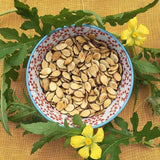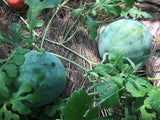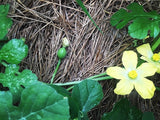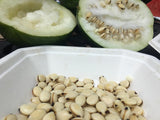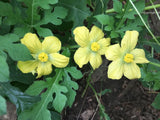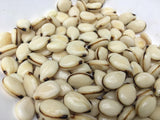Egusi Melon
Citrullus lanatus
Egusi is used primarily in West Africa for its de-hulled seeds, which thicken soups as a flour, are a great snack whole, make a paste like peanut butter, and have a high oil content. Egusi is the name for many species of cucurbits (melons, watermelons, and gourds) whose seeds are used for this purpose.
Similar to Callaloo, egusi is a category of crops based on their similar function. See the Lost Crops of Africa volume II for a short list of species and lots of great info about this important seed crop. They mention that egusi is mostly grown by women, and that improvements in the promotion and sales of this seed will bring up the "egusi wage," which is defended by women farmers of all ages as their standard of living depends on it.
Egusi soup is central to many West African cuisines, and is also an offering to several Orisas (including Obatala) in Ifá religion in Nigeria and beyond. Also in Nigeria, the bitter flesh of the fruits are sometimes included in a decoction (or àgbo, in Yoruba) for various ailments or for general wellness.
We are very grateful to have sourced our seed from Serendipity Seeds, who called this variety Egusi-itoo (Cucumeropsis mannii), though we believe this may actually be another Egusi species: Brown-Seeded Melon from Nigeria (Citrullus lanatus). The seeds are fat, white, and beautiful, and according to Truelove Seeds apprentice Amirah, who requested we grow this crop, the flesh is the essence of bitterness. We are so grateful that it seemed happy in our hoop house, and excited to deepen our relationship to its seeds and its story.
Known as: Egusi, Agushi, Egusi Bara, Gusi Abara, Bitter Melon
Thank you to Yemi Amu of Oko Farms for sharing some of this information with us!
Days to maturity: 120-160
Seeds per pack: 15-18
Germination rate: 84% on 11/07/2025
Planting / harvesting notes
Direct sow in warm soil after the last frost, or seed indoors 2-3 weeks beforehand and transplant. Space 18" apart in the row. Harvest fruits before first frost, or when the attached stem withers and turns brown. Use a sledgehammer or a rock to break open fruits on a tarp. Using a knife (as shown in our photos) slices many of the seeds.
Seed keeping notes
Squash are insect pollinated and require about 1/2 a mile of isolation from other varieties of the same species, which we believe in this case to be the same as Watermelon - Citrullus lanatus.The seeds will be fully mature when the fruit gets large and the stem withers. Separate the seeds from the flesh, rinse them, and dry them on a screen or paper product away from direct sunlight in a ventilated place. The plumpest and hardest seeds will be most viable.







